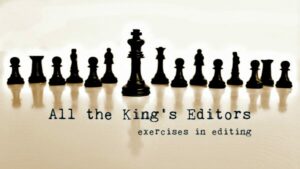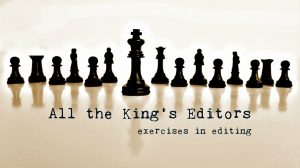Posts by Jim Dempsey
Jim’s post is part of the “All the King’s Editors” series, where an editor from the Writer Unboxed contributor team edits manuscript pages submitted by a member of the WU community.
Each participating editor approaches a submission in a unique way, and speaks only for him or herself.
Remember, editing is as much art as science, and your take on the passage may differ. If so, feel free to join in the discussion at the end, but above all, be kind.
If you’re interested in submitting a sample for consideration, click HERE for instructions.
This is a short piece, and doesn’t need much of an introduction since it’s a prologue.
A prologue should give a sense of the story and hook the readers. As an editor, I have to ask if the prologue achieves at least one of those goals. As a reader, I ask: why start the story here and not with chapter one? In other words: do we really need the prologue? Let’s see …
Read MoreI just had my in-laws staying. For seven weeks! Don’t get me wrong, they’re nice, easy-going people (at least, they kept telling me so), but I reckon Ghandi could test your patience after seven weeks in your spare room.
There was no one thing they did to annoy me (OK, there was one thing: “The car had an accident,” said Pops. It wasn’t him. It was the car.) It was all the little irks and ticks that built up over the time. And it was a long time. Seven weeks. Did I mention that already?
By the final week, I was frazzled. And my wife was away on business, leaving me to deal with them on my own. It came to a head one evening when I had to ask Mom, again, not to snap the spine of my paperbacks when reading them (“But it’s so much easier to hold in one hand.”)
I had to talk to someone. I had to get it all off my chest. But it was 11pm, who could I call? My wife’s days were full with meetings and preparing for meetings and, anyway, I’d just be moaning again if I called her. Who else then? Who could I call at that time of night to sound off?
It’s at these moments you realize the kind of support network you have. It’s a special kind of someone who’ll take that kind of call at that time of night and still give the level of sympathy you’re looking for.
There will be times in your story, too, when your protagonist needs support. And it’s not always obvious where that support will come from. Sometimes you have to dig deep to find that secondary character who will step in to save your hero just at the right time.
Read MoreJim’s post is part of the “All the King’s Editors” series where an editor from the Writer Unboxed contributor team edits manuscript pages submitted by a member of the WU community.
Each participating editor will approach a submission in a unique way, and speaks only for him or herself.
Remember, editing is as much art as science, and your take on the passage may differ. If so, feel free to join in the discussion at the end, but above all, be kind.
If you’re interested in submitting a sample for consideration, click HERE for instructions.
These pages are from the second chapter of this novel, and for me they set the tone and place of the story perfectly—a light, funny paranormal tale set in California.
Two things struck me about this text. One was how the author gets in the description of the first person narrator and then how you can gain—or lose—the readers’ trust through breaks in story logic. Look out for these as you read, and I’ll explain more in my numbered notes at the end.
I made very few changes to the text as these pages looked pretty polished. Most of my revision suggestions would need more input from the author, but it wouldn’t take much to get these pages into great shape.
Read MoreAll characters have desires. Desire is the engine that drives your story, it’s what gives the hero a goal—find the killer, fall in love, destroy the death star.
If your characters get what they want on page one, there’s no story left. It’s your job, as an author, to give your characters what they want at exactly the right time. Or not at all.
Until then, you have to play with that desire, use it to develop the drama that will push the story along and pull your readers with it.
There are a few straightforward ways to use your characters’ desires to inject drama into your story, to fuel that engine that will keep your readers engaged.
These techniques are useful for when you’re stuck, when you’re not quite sure what’s going to happen next. They can also help to get back control of your characters when they run off and do their own thing, when they stray away from your carefully plotted plan.
Hold back
The most obvious way is to keep your character wanting.
As I said, the story (usually) ends when your characters get what they want. Keep that goal just out of reach until you’re ready, until it’s time to give your characters—and the readers—what they want.
Too much, too little, too late
Sometimes you can give your characters what they want and still keep the story going.
If you give them too much of what they want, that will also create conflict. You can even give them too much right at the start and use that as a story premise. Reality shows like The Bachelor use this to drive a full season. He wants a bride and now he has to choose from 25 potential partners.
Giving too much can even be like giving someone dying of thirst a whole bottle of water: if they drink it all in one go, they’ll be sick. Your characters will have to be careful when they get more than they need. Will they have the kind of self control necessary to handle it?
Similarly, if you give your characters just a taste of what they really want, that can lift their desires even higher and increase their motivation to get more.
Money is the obvious example here, but you can use time too. Give them enough to get within reach of their goals, but not quite enough. They will then desperately need that last little bit.
And then there’s when your characters get exactly what they want, but it’s too late. They don’t need it any more.
This works especially well with smaller desires throughout the plot, in scenes or in individual chapters. They find the combination for the bank vault, but they’ve already blown the doors off and now the cops are on their way.
This can be useful to reveal the characters’ frustrations and emphasize how great their desires are, and it can be used to add to humor too, to lighten the mood a little.
And now for something different
Read MoreEnsuring consistency is a big part of my work as an editor. As I work through a book I make sure there are no variations in how words are spelled: it should be either while or whilst, never both in the same text. The same with words like among/amongst, towards/toward, and O.K./OK/ok/okay. Numbers below 10 are either written out or not. Or all numbers are written out. Or not. Or only when accompanied by a measurement, e.g. all six competitors were over 6 feet tall.
Chapter titles should all be the same: centered or not, same typeface throughout. Any lists should have the same punctuation each time they appear: a period, semicolon or nothing at the end of each line. Always one or two spaces after a period, never sometimes one and sometimes two (but let’s not get too deep into that discussion).
Editors use a style guide to keep all this consistent, sometimes following an established one, like the Chicago Manual of Style, as well as keeping an individual style guide for each new book to make sure the particularities of that book, or series, are always the same, such as character names and place names. Does the character have blonde hair (or even blond hair)? How many children does the character have, if any, along with their age, size, occupation and so on.
These are all easy to keep track of and easy enough for an editor to change. It’s part of the job. What’s more difficult to revise is when characters don’t behave consistently. And that can happen very easily.
Avoid a major rewrite
Maybe your hero has always been a good friend but chooses to go watch a movie rather than bail his best buddy out of jail. If the buddy gets out of prison the next day and they argue about the bail before the story continues, then there’s not much of a problem. If the buddy dies in jail and that’s what sends the hero to investigate the death, it could look contrived, a touch too convenient that the hero was at a movie that night.
Such inconsistencies can lead to major revisions, a bigger rewrite than you were hoping for. And it’s better to catch these things before you send your manuscript to an editor—and definitely before submitting it for publication—because a major rewrite is likely to mean at least one more round of copy-editing.
And it’s easier than you might think to introduce character inconsistencies into your writing. You could have had a long break between writing chapters because, well, that’s how life goes. Or it could be that you don’t yet know the characters well enough to know how they’ll react to each specific situation.
There’s not a lot you can do when life gets in the way. You can try to develop good writing habits, write at particular times every day or week, set goals to write for an hour, two hours or 1,000 words at each sitting. But eventually something will happen to get in your way again.
Discover your characters
There are, however, various ways to help you get to know your characters and make sure they react consistently throughout your manuscript.
Read MoreIt seems like a tall order, to write something that will change your life. And it is. But I think it’s still worth striving for.
By changing your life, I don’t necessarily mean that you have to write something that will earn you lots of money so you can buy an island or even enough money that you can quit your day job. Although, if becoming rich (or rich enough) is important to you, then that’s fine too.
And that’s the point, to write something that is important to you, something that comes from your heart, something that means a lot to you. As I said, money might be important to you, but it might be worth digging deeper to ask why money would be important.
If you want to use the money to buy a house for each of your kids, then it’s not the money that’s so important but your family’s long-term security. If it is an island you want, then maybe that’s because of your love for nature, quiet and rest.
It’s not always so easy to know what’s truly important to you, but there are—of course—some useful exercises to help determine your deeply held values.
1. Ambitions
We develop many of our most important values at an early age, and one way to find out what matters to you most is to go back and try to remember what your ambitions were as a child.
Think back to when you were young. What did you imagine your future would be like? Did you want a happy life with a family? Did you have a hero, someone you wanted to be like when you grew up? If so, what qualities did that person have that you admired?
Use these questions to write a few lines about your ambitions as a child. From your answers, you should already get a sense of what is most important to you. It could be that family, career, justice, or friendship is what matters most. Other values could be anything from adventure and assertiveness to sexuality and spirituality.
2. The interview
Even if you only write in those few spare moments you have in the week, it’s still useful to think of your work as an author as a career. What, for example, do you want to achieve with your writing? And what special skills do you have to make that happen?
Imagine you’re preparing for a job interview to be an author, your kind of author. Think about some of the following questions and even make short notes if you want.
Read More“Be a sadist,” said Kurt Vonnegut. That’s number six on his list of eight creative writing 101 tips. He added, “No matter how sweet and innocent your leading characters, make awful things happen to them – in order that the reader may see what they are made of.”
Vonnegut knew what he was talking about. He made awful things happen to Billy Pilgrim, his leading character in his most famous novel, Slaughterhouse-Five. It was not enough to send Pilgrim unprepared into the thick of World War II and have him captured by the enemy, Vonnegut then sends him into the worst firestorm of the war—Dresden in February 1945. And that was just the start of poor Pilgrim’s problems.
Vonnegut’s inspiration came from his own life. He’d been a prisoner of war held in a slaughterhouse in Dresden in February ‘45. Fortunately, it’s not essential to go through quite such a trauma to create great leading characters. There are far easier ways to give your hero a hard time.
For Robert Towne, who won an Oscar in 1974 for his screenplay Chinatown (remember what a rough time he gave Jack Nicholson’s character, Jake Gittes?), the best way to get tough on your hero is to ask: What are you afraid of? If you can discover your characters’ fears, then continually confront them with those fears, you’ll create memorable, engaging characters.
This might sound like every story should be a horror, but that’s not the case. In Chinatown, for example, Jake is obsessed with being a detective, to the point that he’s willing to work for free. His weakness is women, and he wants to protect them. His fear is that a(nother) woman will be harmed or even killed while he feels responsible for her. This fear and this need to protect leads him to misinterpret events and miss important clues, getting in the way of his obsession to be a good detective.
Fundamental fears
As the author of your story, you can of course simply assign your character a fear. But the best characters, the ones we remember, have personalities—and therefore fears—that are intrinsic to the story. They make sense in the story’s world. To take an extreme example: if the main character of your romance is afraid of snakes, it will only interrupt the story if you then drop that character into a pit of snakes every few chapters for no other purpose than to invoke some tension (except, maybe, if the love interest is a snake charmer).
Here then is one way to get to the depths of your characters’ fears.
Read MorePlease welcome Jim Dempsey back to Writer Unboxed today, this time as our newest regular contributor! Jim is a professional member of the Society for Editors and Proofreaders and works as a book editor at a company called Novel Gazing. In his own words, Jim tells us that:
I’ve been editing for just over 20 years, and the thing that still fascinates me about literature – or any art – is how it can tell us so much about ourselves and what makes us uniquely human. In that respect, fiction especially has a lot in common with psychology, and I’m always interested in the points where these two meet, and what psychology can teach us about fiction, and what literature can teach us about being human.
You can learn more about Jim and his services on his company website, and by following him on Twitter (@jimdempsey and @novel_gazing).
Three Ways to Discover Your Character’s True Motivation
It might seem obvious to say (or just plain odd), but your characters don’t know they’re part of a story. Except for some metafictional works, your characters think they are real people. They want to behave like real people – and readers want them to behave like real people. That means that the actions they take and the choices they make are all done for a reason. What they do has to make sense to them (and the readers).
Your main character chose to be a hero, at least the hero of this story. Certain circumstances led them to that decision and the position they’re now in. They chose to act in one way rather than continue with how their old life was going. It wasn’t a random decision. It was motivated by events, the past and influences from other characters (who also don’t know they’re in a story).
Your characters – especially protagonists – will make many choices over the course of the novel. They will go this way or that. Knowing what truly motivates your characters can help you decide which direction they, as a real person, will choose and – more importantly – why. This will make your characters even more believable, more human, and the story more engaging.
Readers don’t need to know the precise details of everything that led to this moment in the story except those that are relevant to the narrative. But it is useful if you – the author – know that backstory and what drove them to this point. These three exercises will help you to discover what truly motivates your characters.
1. The opposite job
Let’s start with something fun. The New York Times had an article recently about opposite jobs. Based on the details of the skills required for certain occupations, determined by the Labor Department, the newspaper developed a tool where you can type in your job and it will tell you the opposite job, the job that requires completely different skills.
The tool lists the skills needed for each job, so you can check to see if your character has what it takes to be in that occupation.
The opposite of a writer, for example, is a mobile home installer. The latter are, apparently, better suited to ‘developing and building teams,’ and ‘scheduling work and activities,’ which I think […]
Read MorePlease welcome Jim Dempsey back to Writer Unboxed today! Jim is a professional member of the Society for Editors and Proofreaders and works as a book editor at a company called Novel Gazing. In his own words, Jim tells us that:
‘I’ve been editing for a little more than 20 years, gradually making the shift from nonfiction to fiction, which is where my heart really lies. After a few years, I was so busy editing novels that it made sense to pool resources with another two editing friends, and together we set up our own company called Novel Gazing. That was in 2012, and although I have continued with a few nonfiction clients, I spend most of my time editing fiction for publishers and self-publishing authors. I enjoy the challenge of fiction, making sure all the pieces fit together to make a perfect whole.’
You can learn more about Jim and his services on his company website, and by following him on Twitter (@jimdempsey and @novel_gazing).
How to Keep Track of All Your Novel’s Details
I recently worked on a story that had two Mondays in the same week. When I pointed this out, the author was so embarrassed to have made such an obvious error, but it’s a simple mistake to make. Raymond Chandler apparently forgot to reveal who killed the chauffeur in The Big Sleep, and one character in The Iliad was still around to witness his son’s death even though Menelaos had killed him much earlier.
It’s those minor characters that are usually the problem. The little details. You know your main characters perfectly, you can see them in your mind’s eye. But was her mother born before the war or just after? Did he meet his first wife when he was a freshman or was he already a sophomore?
Editors have a similar problem when they start to work on your book. They don’t know anything about your characters, the world they live in, who did what or when, but they still have to keep track of it all. They have to be able to point out that John, who had a bad limp in chapter 3, is now escaping over back-yard fences like an Olympic hurdler or remind you that the witness spoke with a heavy British accent when she was first interviewed but sounds more like a Southern belle when the inspector revisits her later in the book.
Keeping track of all of these details and idiosyncrasies is essential for the editor, and it’s useful for authors too to make sure your characters, settings, style, and backstories are consistent.
Avoid confusion
Having two Mondays in the same week and other issues with your story’s timeline in particular can be time-consuming errors to correct. It can mean that everything after that blip gets knocked out of sync too. And a simple find-and-replace to change every Monday to Tuesday won’t work as you then have to change every Tuesday to Wednesday and so on, plus check for every mention of ‘yesterday’ and ‘tomorrow’ and ‘day before’ too.
More importantly, a disturbed timeline can confuse readers: ‘I thought the murder happened on Monday, but now she’s saying today is Monday.’ […]
Read MorePlease welcome Jim Dempsey to Writer Unboxed today! Jim is a professional member of the Society for Editors and Proofreaders and works as a book editor at a site called Novel Gazing. In his own words:
“I began my professional career as a journalist, working mostly in radio, and then, in the late 1990s, I adapted radio stories for the web. This meant editing my colleagues’ work to be read rather than heard. That took a lot of on-the-job training, courses, and a close attention to detail since radio journalists don’t need to have great grammar or spelling skills. Stories – pretty much all stories, fiction or non-fiction – have always been my passion. I studied them to get a Master’s degree in creative writing, and have always helped friends with their stories as they wrote novels. That gradually expanded to friends of friends and kept going until I was editing novels full time. I started Novel Gazing with two fellow editors in 2012, but that journalist in me still likes to get out now and then to write articles about editing, writing and, of course, stories.”
You can learn more about Jim and his services on his website, and by following him on Twitter (@jimdempsey and @novel_gazing).
How a Professional Editor Can Improve Your Writing
Editors do more than correct errors and rearrange sentences, they also develop a deep understanding of your book so that your readers will understand it too. Take a look at the two samples below. Which one is easier to read?
Most people would say that 2 is an easier read (note that I asked ‘easier,’ not ‘better’ – I’ll come to that in a moment).
And all it took to make the text clearer was some straightforward copy-editing. That means more than simply adding some commas and periods – the editor also has to understand what the author is trying to say.
Unfortunately, that isn’t always clear from just reading the text. Where there are doubts about the author’s intention, the editor has to ask for clarification.
This time I wasn’t able to ask the author. Samuel Beckett, most famous for writing Waiting for Godot, died in 1989.
This extract is from Molloy, and Beckett knew what he was doing when he wrote it. In the context of the novel, his style works perfectly. It emphasizes the sense of confusion. The wandering sentence is as lost as the character expressing it.
So, my revision of Molloy would be to miss the point of what Beckett was trying to say.
The understanding editor
And that’s why it’s important for an editor to understand not only what you, the author, is trying to say with each and every sentence but also understands what you want to say with your entire manuscript and how you want to say it.
To get that understanding, the editor has to read your work closely and appreciate why you have chosen those particular words and expressed them in that particular way. The editor has to know what you are trying to tell the reader.
To do that, the editor also has to see your book as the readers would see it – ideally as your […]
Read More- « Previous
- 1
- …
- 3
- 4
- 5

















